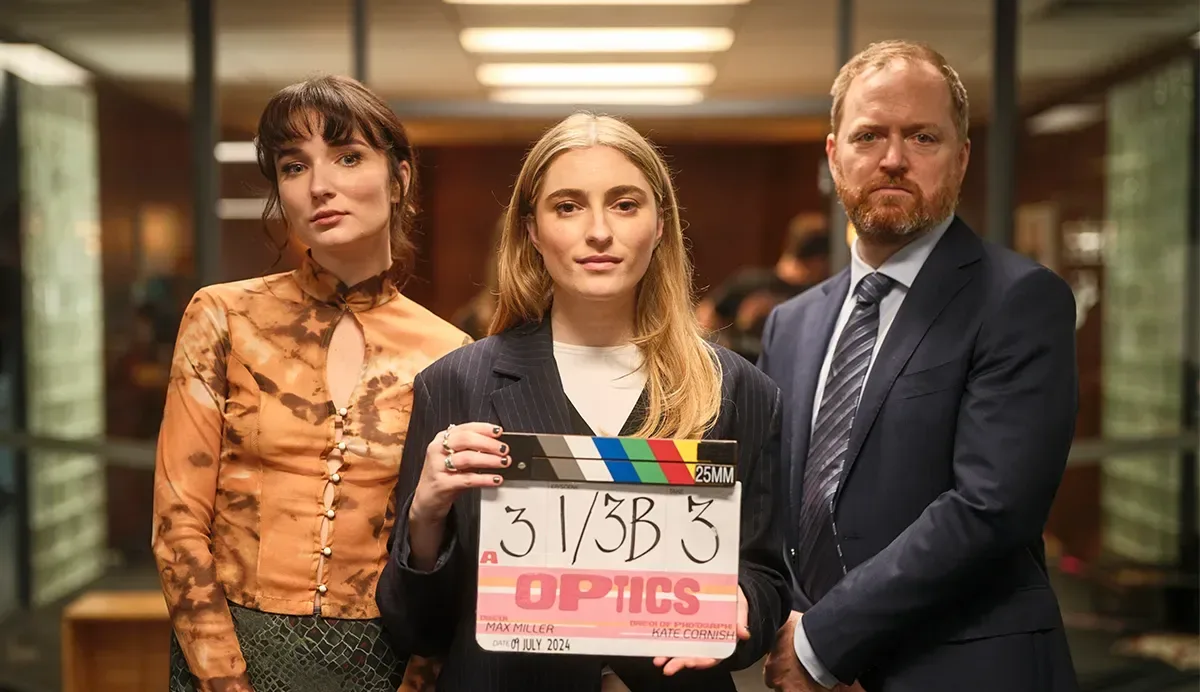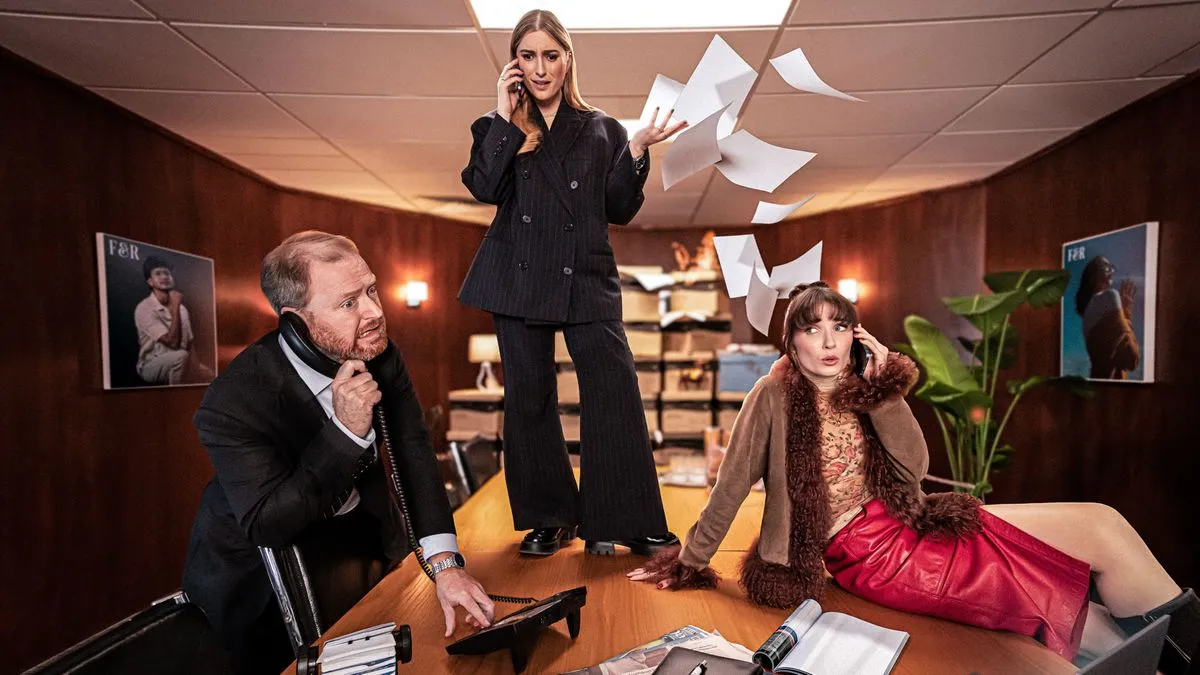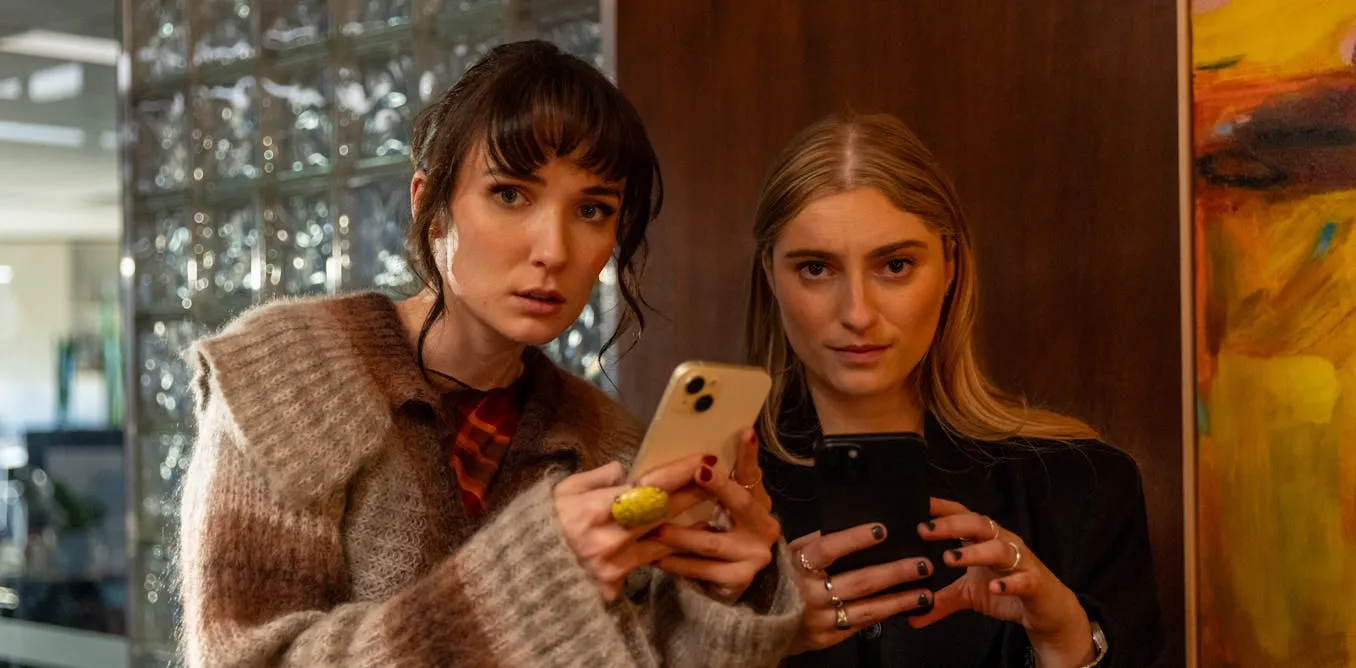“Optics” examines crisis management within the PR firm Fritz & Randell. The story begins with the CEO’s unexpected death during a critical meeting, triggering a leadership transition.
Two young employees, Greta Goldman and Nicole Kidman, step into co-CEO positions, seemingly intended to promote diversity. Their promotion appears superficial, exposing ongoing tensions between authentic empowerment and surface-level representation.
Greta and Nicole represent a connected generation, addressing complex and ethically challenging public relations scenarios. Their experience highlights societal critiques, exploring the challenges of meaningful representation and challenging traditional corporate power structures.
Through their handling of various scandals, the series offers a sharp exploration of diversity efforts, inviting viewers to reflect on real social changes beneath performative gestures.
Character Dynamics in “Optics”: Empowerment versus Obsolescence
“Optics” explores the interactions between its main characters, each representing different aspects of workplace culture. Greta Goldman brings youthful ambition and ethical awareness to her role. She seeks career growth while maintaining personal integrity. Her connection with Nicole Kidman, her co-CEO, creates a powerful partnership that confronts challenges within their PR firm’s traditional structure.
Nicole demonstrates tech skills and quick thinking that complement Greta’s approach. The pair works effectively in the chaotic PR environment, using humor to address difficult situations. Their interactions reveal the struggles of women seeking authentic leadership in a complex professional landscape.
Ian Randell, the company heir, presents a contrasting perspective. His outdated views highlight the generational tensions within the workplace. Ian struggles to adapt to changing professional dynamics, ultimately serving as a character who must recognize the shifting paradigms of corporate leadership.
The story examines women’s experiences in leadership, generational workplace shifts, and the search for genuine representation. Greta, Nicole, and Ian create a narrative that explores power dynamics, professional growth, and the challenges of creating meaningful change in corporate environments.
Thematic Depth in “Optics”: A Satirical Lens on Morality, Gender, and Media
“Optics” explores the ethical challenges of public relations through Greta and Nicole’s experiences. The series reveals the complex world of crisis management, where truth often bends to protect brands and individuals from scandal.
Each episode presents a new challenge, from a footballer’s controversial incident to allegations against a female entrepreneur. Greta and Nicole wrestle with their role in managing narratives, seeking to maintain some ethical grounding while working within a system that frequently compromises integrity.
The show examines gender dynamics within corporate structures. Greta and Nicole’s promotion highlights the phenomenon of “glass cliffing,” where women are placed in leadership during challenging times. Their elevation seems both an acknowledgment of their skills and a strategic move to shield the organization from potential backlash. The characters expose the persistent challenges women face in leadership roles, revealing the deep-rooted obstacles within professional environments.
The narrative dissects media’s role in shaping public perception. “Optics” uses irony and humor to demonstrate how information gets manipulated. The storytelling exposes the gap between public narratives and underlying truths, challenging viewers to question the information they consume. The series captures the intense media landscape, showing how easily truth can be distorted by marketing and sensationalism.
Wit and Satire in “Optics”: A Script for the Modern Age
The script for “Optics” delivers engaging dialogue that captures the intense world of public relations. Co-written by Jenna Owen and Vic Zerbst, experienced performers and sketch comedians, the writing pulses with energy and insight.
Their comedic background infuses the series with quick-witted exchanges that explore complex ethical challenges. The dialogue skillfully blends humor with deeper social commentary.
“Optics” uses comedy to examine the PR industry’s manipulative practices. The series creates satirical moments that expose the absurdity of managing public scandals. Comedic scenes reveal uncomfortable truths about corporate strategies and societal values. A scenario involving a football player’s scandal demonstrates how companies protect their public image, mixing humor with critical observation.
The show represents a contemporary approach to storytelling. By weaving sharp social critique into comedic narrative, “Optics” connects with audiences seeking intelligent entertainment. The writing challenges viewers to think critically while providing genuine laughs, showcasing the power of comedy to illuminate social dynamics.
Cast Dynamics in “Optics”: Chemistry and Characterization
Jenna Owen and Vic Zerbst bring depth to “Optics” through their portrayals of co-CEOs Greta Goldman and Nicole Kidman. The actors’ comedic backgrounds create a compelling on-screen relationship. Owen’s Greta displays earnest determination, while Zerbst’s Nicole offers a tech-connected perspective.
Their performances capture the struggles of women seeking leadership in a male-dominated industry. The characters’ interactions reveal the challenges of professional growth and personal authenticity.
Charles Firth plays Ian Randell as a counterpoint to the dynamic female leads. His character embodies outdated corporate masculinity, struggling to adapt to changing workplace dynamics. Firth brings nuance to Ian, creating moments of humor and unexpected vulnerability. Guest stars like Kate Walsh add layers to the narrative, exploring different perspectives within the PR world.
The ensemble cast creates a rich exploration of workplace relationships and social change. Through their performances, the actors illuminate the complex interactions that define modern professional environments.
Behind the Curtain: “Optics” and Its Creative Force
Jenna Owen, Vic Zerbst, and Charles Firth lead the creative team behind “Optics”. Owen and Zerbst, recognized for their comedic sketches and social commentary, bring their distinctive style to the series.
Their performances explore the public relations world with humor and precision. Charles Firth, known for his work on “The Chaser,” adds depth to the show’s satirical approach. The trio crafts a narrative that dissects corporate life through comedic exploration.
The series presents a polished visual experience that supports its storytelling. Office environments and crisis management scenes create a dynamic backdrop for the characters’ experiences. Quick pacing matches the energy of the PR world, keeping viewers engaged. Sleek cinematography highlights the tension between professional appearance and underlying chaos.
The show blends comedy with social observation, creating a nuanced exploration of workplace dynamics. Owen, Zerbst, and Firth use their comedic expertise to reveal the complexities of professional environments, offering viewers both entertainment and insight into contemporary workplace culture.
Contextualizing “Optics”: A Reflection of the Australian Media Landscape
“Optics” explores the complex world of public relations in Australian media. The series examines how companies manage communication and public image during challenging situations. It reveals the intricate dynamics of corporate messaging in an era of social media and instant information. The show critically looks at how organizations handle scandals and public perception.
The series incorporates humor that speaks directly to Australian audiences. Comedic moments highlight the quirks of corporate culture, from sports references to workplace communication styles. These elements create a unique viewing experience that connects with local viewers while remaining engaging for broader audiences.
“Optics” delves into themes of diversity, accountability, and leadership. The show uses comedy to critique corporate communication strategies, exposing the tensions between public image and genuine organizational values. Through its storytelling, the series provides insight into the challenges of modern professional environments.
The Review
Optics
"Optics" provides a comedic exploration of public relations through the performances of Jenna Owen and Vic Zerbst. The series examines ethical challenges, gender dynamics, and media manipulation with sharp storytelling. While occasionally falling into familiar narrative patterns, the show delivers engaging dialogue and cultural insights. The series captures the complexities of corporate communication with humor and critical perspective.
PROS
- Strong lead performances from Jenna Owen and Vic Zerbst.
- Sharp, witty dialogue that blends humor with social commentary.
- Timely exploration of relevant themes like corporate ethics and gender dynamics.
CONS
- Some episodes may feel predictable or formulaic.
- Occasional unevenness in character development.
- The humor may not resonate with all audiences, particularly outside Australia.




















































